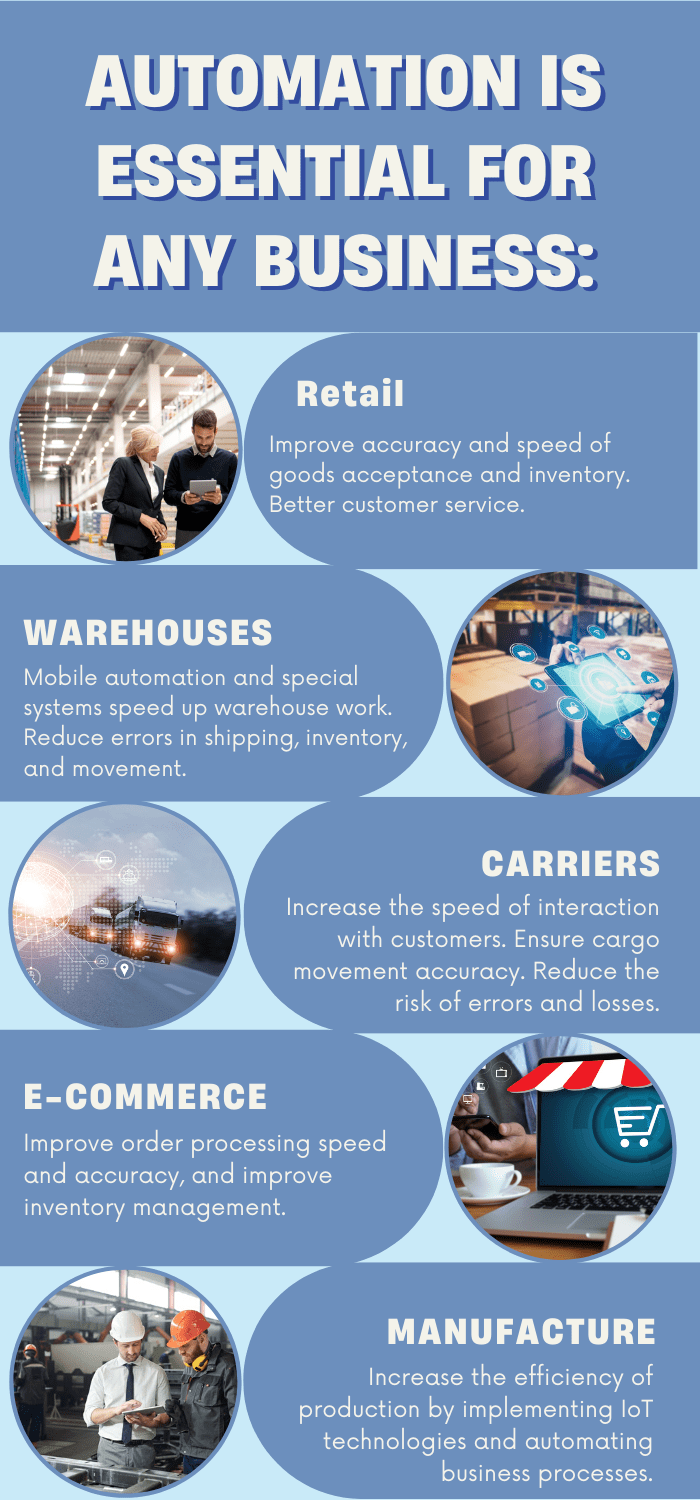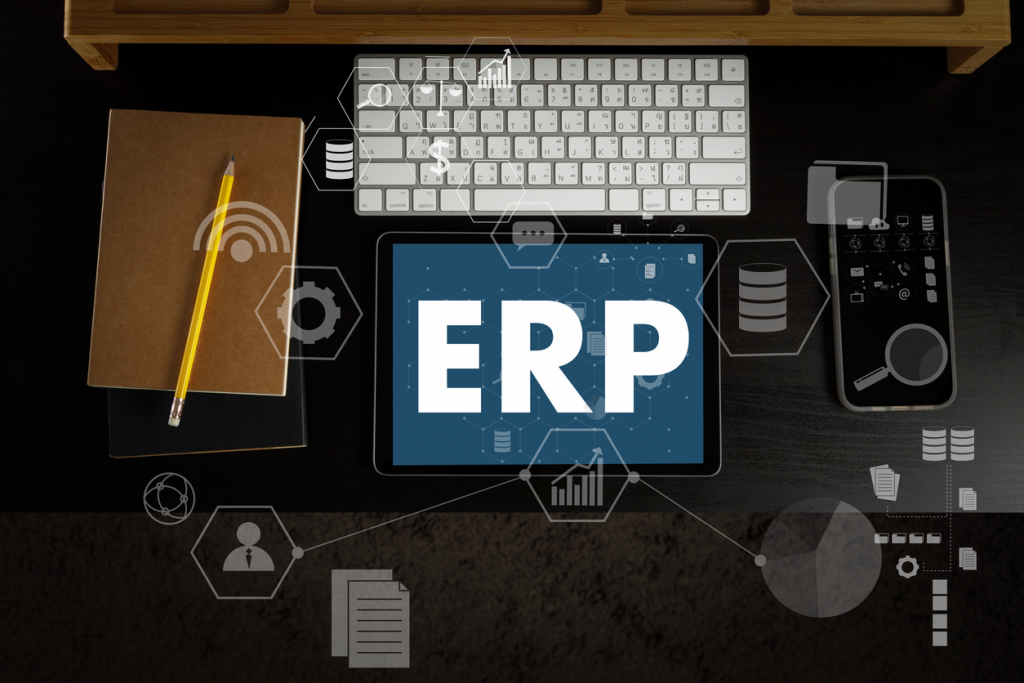Last Updated on January 16, 2023 by Tatyana Vandich
Why Do You Need Business Process Automation?
Automation of business processes is the implementation and operation of specialized information systems, software, and applications that minimize the routine and optimize labor and production resources, to increase the productivity and efficiency of a company.
The automation of business processes allows to free up resources, helps plan further business activities, and permits to quickly make important business decisions. For this, automation is the main key for the success of any business.
What Kind of Business Processes Need Automation?
Automation is essential for any business:
- RETAIL To improve the accuracy and speed of goods acceptance, and inventoryon the trading floor and in the warehouse and to improve customer service.
- WAREHOUSES To speed up the work of the warehouse with the help of special systems and mobile automation. Eliminate errors in the acceptance, shipment, inventory, and movement of goods.
- CARRIERS To increase the speed of interaction with customers, ensure the accuracy of the movement of each cargo. Reduce the chance of errors and losses.
- E-COMMERCE To increase the speed and accuracy of order processing and improve inventory management updates.
- MANUFACTURE To increase the efficiency of the production process by implementing IoT technologies and automating business processes related to production.

Properly implemented automation flows, improve business processes in any company, regardless of industry or size: from a huge manufacturing company to a small online store. Each company has its own specific tasks and goals; therefore business processes can also be very different. However, most automation goals are generic for all kinds of companies:
Savings
Savings is one of the main goals of automation. Companies are investing in ERP and CRM software and adopting EDI to increase productivity and cut costs. Thus, the company saves time, money, and human resources by automating the processes of different transactions and sales, while increasing turnover and profit.
Speed Up Business Processes
Streamlining and speeding up business processes is another key task of automation. Reducing the time for each operation, and defining clear procedures and deadlines for each stage makes the business process efficient, transparent, and streamlined.
Increasing Business Transparency
Properly executed automation, when each business system or application, for example, ERP or CRM, does not work separately but interacts with each other, helps employees from various departments (warehouse, accounting, sales department, etc.) work in a single unified information system.
Transparency and clarity of processes lead to an increase in revenue due to the elimination of conflicts with business partners (suppliers, 3PL providers, drop shipper partners, etc.) and lead to customer loyalty.
Automation and integration of business systems allow to maintain a constantly updated connection between all departments of one enterprise. Such automation allows clients to receive timely and high-quality service, and heads of departments to receive important data and statistics in real-time.
Business Automation: Where to Start?

It is necessary to automate routines and processes that take a lot of time and manual labor to complete, that can also open the door for substantial human errors and inefficiencies. For example, in retail and e-commerce, the process of receiving and processing incoming orders and inventory management, are the most critical.
Fill out the form here for a free consultation. We will contact you, schedule a time of convenience, discuss the business processes, and challenges your company is facing. Our experts will analyze your business and develop recommendations for automating business processes.
Cloud Services

Currently, cloud services and cloud technologies are very popular and widely available for all businesses. For example, managed cloud services provide many opportunities for business development, especially for small and medium-sized enterprises.
What is Managed Cloud Service? The term managed cloud services refer to the outsourcing of IT infrastructure, as well as its support, to a cloud service provider. To improve the efficiency of business operations, the service provider is responsible for monitoring, security, and maintenance of the company’s cloud environment.
CRM Systems

CRM (Customer Relationship Management) is software designed to automate customer interaction strategies to increase sales and optimize marketing strategy. CRM systems provide businesses with a central place for storing customer and prospect data, tracking interactions with customers, and sharing information among colleagues. Through CRM systems, businesses can improve their relationship with customers, which helps the business grow.
ERP Systems

ERP (Enterprise Resource Planning) is software for automating the business processes of a company. The main purpose of ERP systems is to increase the overall productivity of the enterprise by reducing “manual” operations, collecting and accumulating data, and streamlining business processes within the company.
EDI (Electronic Data Interchange)

EDI (Electronic Data Interchange) enables the exchange of business messages between organizations in a structured digital format based on regulated message formats and standards. This is referred to as “process automation” of business messages at the B2B level. It allows automating the exchange of necessary business documents such as invoices, orders, ship notices, and many others with different business partners.
Currently, there are various types of EDI solutions that can be installed both locally and in the cloud. EDI2XML, a leading EDI provider, offers all types of EDI services:
If you want to learn more about EDI solutions download the free EDI guide
IoT Technology

The use of IoT technologies in manufacturing enterprises for the management of technological equipment and data collection. IoT technologies allow you to customize the interaction between two different machines or complex business processes, eliminating human errors.
To figure out where to start and how best to automate your enterprise, you should contact a trusted and reliable IT service provider such as “Namtek Consulting Company“. The company’s specialists will help analyze your production cycles and recommend how best you can optimize costs and increase income.
Importance of Automation and Integration of Business Systems
It is important to keep in mind that the use of all the above business systems, in an heterogenous environment, does not guarantee success. The key for success is to have all systems and applications fully integrated, and capable of interacting with each other, in a near real-time manner.
This means that all data from various systems, and applications, including those received through EDI, or from your e-commerce store should automatically be populated to all your business systems (ERP/CRM).
Business systems integration streamlines business processes and task management. All office and remote employees can work in a single information space (ERP, CRM…). They can coordinate their actions, receive, and delegate tasks. All operational work is carried out in a single system and any employee can access data within their competence, as well as request access or upload data, if necessary.
Without automation and integration of business systems, communication between employees is fragmented and spontaneous, in which it is easy to create costly human errors.
Conclusion: Business Process Automation
In the past, automation was only available to big businesses, but now it’s a must-have tool for small businesses.
Don’t ignore modern technologies, but adapt them to the needs of your business. If you are not sure where to begin or how to improve your business processes, please contact us for a free consultation.




